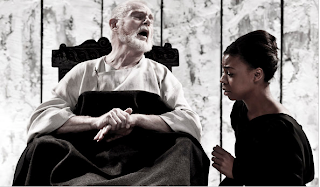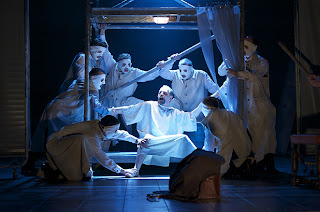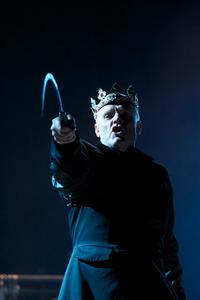32
Double Falsehood was recently deemed a genuine Shakespeare play, and a handful of productions have sprung up across the world. It is said that he co-wrote an earlier version of the play (under a different name) with John Fletcher, a popular playwright in his time. Before the play was deemed Shakespearean, no-one performed or cared very much about it. It is the only play I haven't read and seen the video of, but seen; I could find either. Because of Double Falsehood's obscurity, I will provide a short summary.
Julio and Violata
The Bard’s early obscure romance is about a two young, sweet lovers named Julio and Leonata, who are engaged to be married pending parental consent. But Julio gets a letter from court, calling him to service. Meanwhile Henriquez, the devilish and impulsive younger son of a prince, pursues a common farm-girl for his love. But when finding her unresponsive to his advances, he rapes her and then deserts her. Violata, as she is called, then disapears into the mountains, leaving her life behind. Henriquez then discovers Leonata alone and decides he wants to marry her. He chases her, exiles Julio, and she runs to a nunnery in the same mountains Violata escaped into. Henriquez brother, thinking him honest, helps him steal Leonata from the nunnery. Violata and Julio meet in the mountains and plot against Henriquez. Together they inform Henriquez's brother of his evil deeds and in the end Julio and Leonata are married, and so are Henriquez and Violata, to preserve her honor.

Henriquez, his father and Julio
With a seven-actor cast, all of the players were stars at one point or another. But Henriquez had the most overall stage time. Being a physically imposing actor, he was big and intimidating, but also nervously smiling when his father, the prince, was near. He would roar at his brother, and then quietly bow to his father. He made it seem as though, under his sneers and snarls, was a gentle lover, confused about how and who to love. It was unclear if he was reallythe bad guy, until the last scene where he violently abolished all doubt by flashing his true colors to Violata and his father. He cursed them both in stead of bowing his head in aceptance (which he was forced to do anyway!). It is extremely tough to portray emotions on multiple levels the way he did.
Henriquez
Julio was noble when with Leonata, and remained so until he was exiled, where he emerged half-naked and smeared with dirt, careeming around stage like a caged animal. The vigor with which he defended her was so chivalrous that not a cough was heard throughout the playhouse.
The opening scene
Leonata was always dressed in white, until she was in the nunnery. She was virtuous in everything, dress, behavior and looks. She fought Henriquez as a maid, not a warrior. When he advanced, she gently stepped back instead of pushing him. Leonata shared little stage time with the only other actress. Violata was very blank throughout much of the play. After she was raped she shook very violently at first, but less so when she began to think of revenge. When in the mountains, if she looked on him it was not with malice, but with a sense of duty to restore justice. This type of mercenary-like emotionless complexion fit the bill for a wronged woman quite well.
Leonata and a messeger
Plays cannot be performed without director and crew, and a good director like Brian Kulick makes all the difference. The set-designed had the stage carpeted, literally! Carpets hung in the backround and three were on the floor. As scenes changed, light illuminated rectangular spots on the floor. Actor then appeared and moved the carpets into the designated spots. The direction had actors utilizing all four corners of the stage, at all times, which filled the large stage with a small cast.
Lenoata and Julio share an embrace
After the show there was a type of press conference and discussion where two Shakespeare scholars from Columbia and Yale explained the origin of Double Falsehood. They said that Shakespeare wrote a play called Cardiño, reportedly derivative of one of the chapters for Miguel Cervantes' Don Quijote. Apparently in the late 1800s someone did a restoration of Shakespeare called (what else?) Shakespeare Restored. The author translated Shakespeare into simpler language. He cited Double Falsehood as someone else’s restoration. But though the play we have is truly a restoration of a restoration, I felt that in many ways it was just as moving as his one of his originals.
![[Monkey-typing.jpg]](https://blogger.googleusercontent.com/img/b/R29vZ2xl/AVvXsEiyvUG_Fmlw8fy1B5iVumYUlisPFJwqSNmBConxdy5UbbV-RNe0Pqfnk9CAmiLB_kxP6h0M5QKfMu2jrA-c91ZebTwLQwBNO_NMeKEu1VGWlEyJD2gIJhE78ipvpNAjIQQBYPCVOdu-eOy3/s1600/Monkey-typing.jpg)
















































